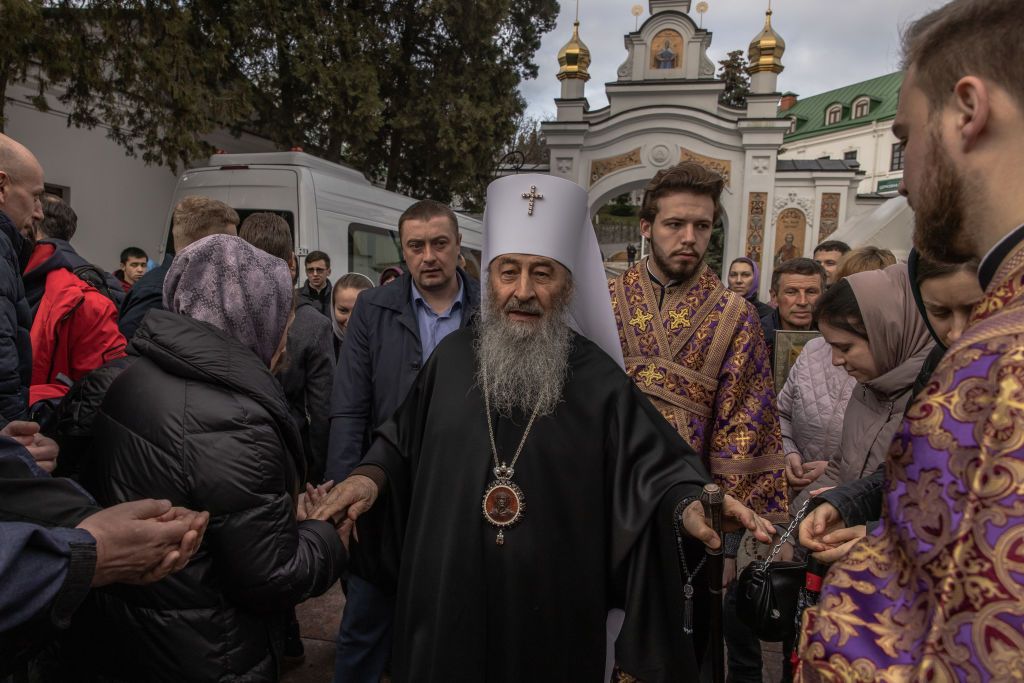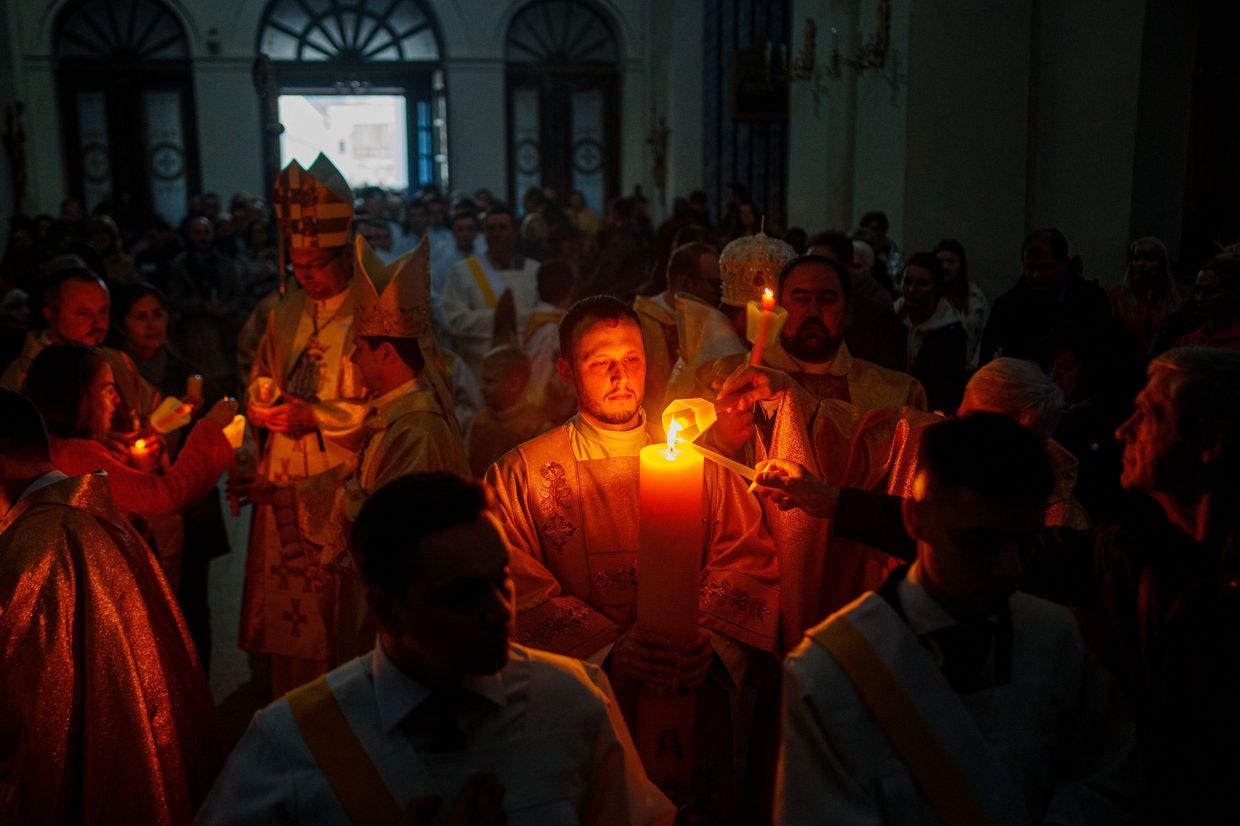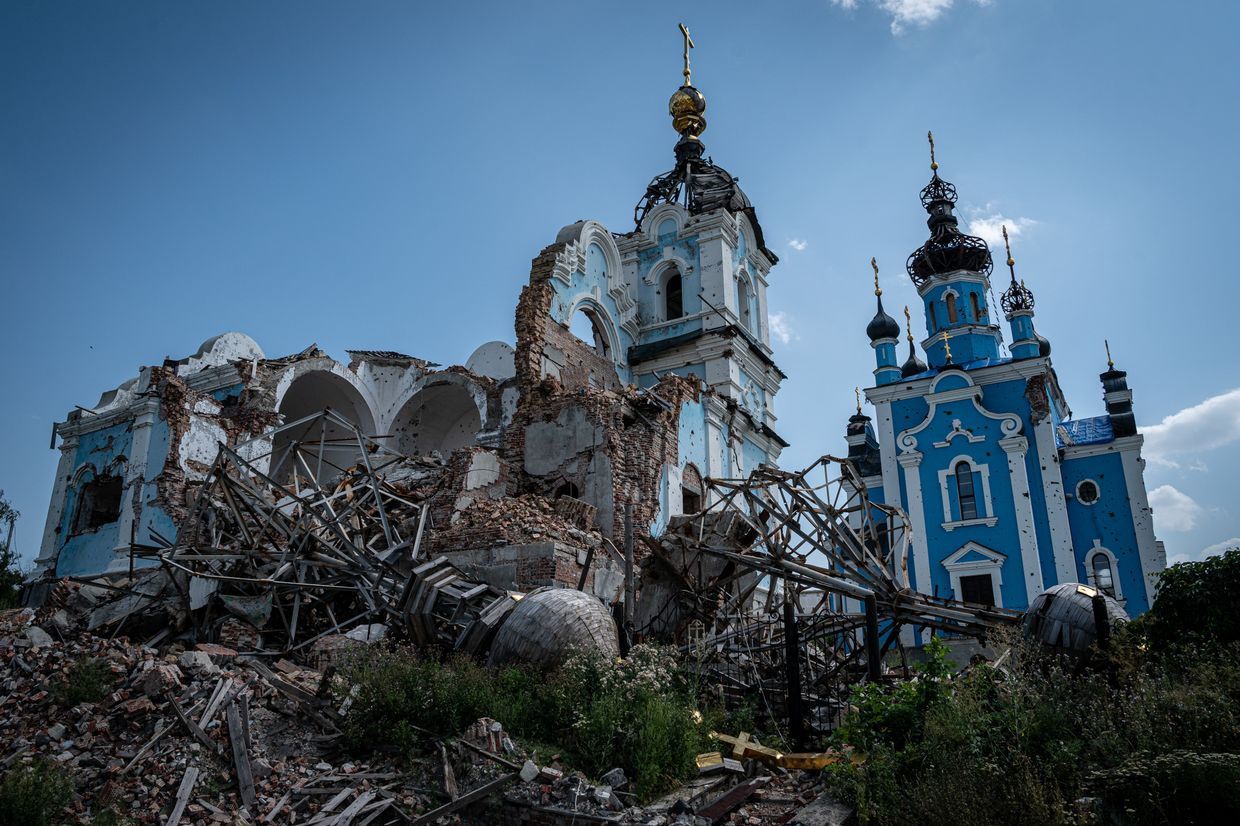Cutting ties with Moscow — What Ukraine's church bill really means

A service led by Metropolitan Onufriy, head of the Ukrainian Orthodox Church (Moscow Patriarchate), at a compound of the Kyiv-Pechersk Lavra monastery, amid Russia's attack on Ukraine, in Kyiv, Ukraine, 19 March 2023, amid Russia's invasion. (Maxym Marusenko/NurPhoto via Getty Images)
Editor's note: The article was expanded with comments by religious scholar Oleksandr Brodetskyi.
Ukraine's parliament passed on Aug. 20 a much-debated bill banning activities of religious organizations with ties to Russia, a country whose armies are currently occupying large swathes of Ukraine's land.
The legislation – falsely spun by pro-Kremlin actors as a "ban on Christianity" – is primarily a tool to force communities of the Ukrainian Orthodox Church of the Moscow Patriarchate (UOC-MP) to finally sever all ties with the Russian Orthodox Church.
"The church in Ukraine will be free from Moscow's influence," commented Andriy Yermak, President Volodymyr Zelensky's chief of staff, just a few days before the bill was adopted.
"There will be no church split here."
The passing of the bill does not mean a sudden disappearance of the UOC-MP, which is only one of the several churches in Ukraine.
It is likely to be followed by months of inquiries and legal battles that, according to experts, may result in some UOC-MP communities switching allegiance to other churches, while others may find ways to adapt and survive.
What next?
Ukrainian officials have stressed one thing – the bill does not restrict faith. It is not a step against any kind of religious belief but aims to sever all ties between Russia and religious organizations in Ukraine.
Iryna Herashchenko, a lawmaker from the opposition European Solidarity party, called it a "matter of national security, not religion."
"Today, I want to celebrate the work of the Verkhovna Rada. A law was passed regarding our spiritual independence," Zelensky commented.
The core essence of the bill is banning the activities of religious organizations that have administrative centers in Russia. It specifically prohibits the existence of the Russian Orthodox Church (ROC) – the leading church in Russia seen as a close ally of Vladimir Putin's regime – as a religious body in Ukraine.
In Ukraine's context, this most directly concerns the Ukrainian Orthodox Church of the Moscow Patriarchate – even though it is not explicitly mentioned in the bill. Officially formed in 1990 as a local branch of the Russian church, the organization was once the dominant religious institution in the country.
The emergence of new independent churches and years of Russia's aggression saw many UOC-MP believers change allegiance, however.
The UOC-MP has come under heavy scrutiny during the war over purported sympathies and ties to Russia, with suspicions often validated by evidence of the clergy's collaboration with occupying forces, justifying Moscow's aggression.
The bill itself did not appear out of the blue. It was registered in the parliament on Zelensky's initiation in January 2023, shortly after the Security Service of Ukraine (SBU) uncovered ample evidence of the UOC-MP's members collaboration, including Russian passports, pro-Kremlin propaganda, and xenophobic literature at the church's premises.
Even so, the passing of the bill does not mean that the UOC-MP's activities are banned outright, as its communities had been given nine months to sever ties with the Russian church.
Following that, a special commission set up by the State Service of Ukraine for Ethno-Politics and Freedom of Conscience (DESS) will carry out inspections of individual religious communities. If the said institution refuses to cooperate, DESS can file a lawsuit, after which the court can decide on a ban.
The bill lists several grounds for a possible ban: preachings that encroach on "life, health, freedom, and dignity of individuals," conviction of priests under various crimes ranging from terrorism to war propaganda and fraud, systematic support for the "Russian World" ideology, encouraging citizens to reject "their constitutional duties," or evidence of a governing center based in Russia.
The reason why each parish will be examined individually is because in legal terms, the UOC-MP does not exist as a single entity but consists of over 8,000 individual churches.
According to the new draft law, Russian-affiliated religious organizations will not be able to use state and communal property. Since some churches are actually in state ownership and on lease to parishes, communities recognized as Moscow-linked will likely be forced to relocate, dissolve, or transition to a different church.
Such property clashes have already arisen, for example, when the state returned the Kyiv Pechersk Lavra – traditionally the center of the UOC-MP in Ukraine – to the state.
Ukrainian Orthodox Church denies links to Moscow
In reaction to the bill, the UOC-MP reiterated its claims that it had already severed all ties with Moscow.
While the bill may have prohibited the UOC-MP, the Ukrainian Orthodox Church does not bear the name of the Moscow Patriarchate in its name, said Metropolitan Kliment, a UOC-MP spokesperson.
"The Ukrainian Orthodox Church will continue to live as a true church, recognized by the overwhelming majority of practicing Ukrainian believers and local churches of the world," the church spokesperson told Hromadske news outlet.
"Any attempts to prohibit (the church) will only serve to discredit – including internationally – those who want to implement it."
Kliment was referring to his church's supposed proclamation of "full autonomy and independence" from the Russian church in the wake of the full-scale invasion in May 2022.
"The Council (of Bishops) adopted relevant amendments and additions to the Statutes on the administration of the Ukrainian Orthodox Church, indicating the full autonomy and independence of the Ukrainian Orthodox Church," the church declared on May 27 while condemning Russia's war, the first and only time.
The step, which was taken after strong pressure from some of its own followers, was not recognized in Russia or in Ukraine.
Despite the council's proclamation, the Sobor – the church's supreme legislative and judicial body – reiterated calls for peace but reportedly did not explicitly express the notion of autocephaly (ecclesial autonomy), without which the legal meaning of the phrase "full autonomy and independence" remains unclear.
The declaration continued to be disputed in Ukraine. In December 2022, the Constitutional Court approved the 2018 law mandating the church to indicate its allegiance to the Moscow Patriarchate in its name. The church has always rejected the label, presenting itself as the sole and only representation of Ukrainian Orthodoxy without any additional adjectives.
However, a report released by DESS in February 2023 said that the UOC-MP did not break its connection with the Russian church, basing its conclusion on an analysis of ecclesial documents. The May 2022 declaration will likely provide little cover to UOC-MP parishes.
"In the parishes' statues, there is a provision that they are a part of the Ukrainian Orthodox Church (of the Moscow Patriarchate)," religious expert Andrii Smirnov told the Kyiv Independent.
"The conducted religious examination has already established that the Ukrainian Orthodox Church is a structural unit of the Russian Orthodox Church."
In turn, the Russian Orthodox Church also refused to recognize the declaration and continued to include UOC-MP priests in various commissions and working groups, only sometimes prompting protests from the said clergymen.
Furthermore, UOC-MP head, Metropolitan Onufriy, remains a member of the Holy Synod of the Russian Orthodox Church, while Ukrainian bishops remain members of the synod of bishops of the Russian church.
Momentum for autonomous church
One foreseeable impact of the bill is the desired push for UOC-MP communities to transfer to the independent Orthodox Church of Ukraine (OCU).
The Orthodox Church of Ukraine was founded in 2018 as an institution representing Ukrainian Orthodoxy fully independent of Moscow.
Soon after its founding, Ecumenical Patriarch Bartholomew of Constantinople, the most senior hierarch of the Eastern Orthodox Church, granted it the tomos of autocephaly—a document signifying a level of canonical independence.
The UOC-MP and the Russian church have long refused to recognize the OCU. In spite of this, some UOC-MP parishes started gradually transferring to the new church, a process that gained new urgency after the outbreak of the full-scale war.
Between the granting of the tomos to the OCU in January 2019 and May 2024, some 1,700 communities announced they are switching allegiance from the Moscow Patriarchate to the autocephalous church.
Although it is not the only option for a transition, the OCU is currently the leading church organization in the country, with some 9,000 communities.
The difference in the number of followers is even more stark – a 2023 poll shows that 69.4% of Ukrainian Orthodox Christians associate themselves with the OCU, while only 9.2% acknowledged allegiance to the UOC-MP. This is a radical change compared to 32.2% for the OCU and 21.9% for the UOC-MP in 2020.
However, this figure does not tell the whole story, as some of the 20.7% of Orthodox Christians who do not openly admit association with any specific institution may still attend UOC-MP churches.
Some 63% of Ukrainians are in favor of banning the UOC-MP, according to surveys.
One of the key reasons why UOC-MP communities may now be more motivated to transition to another church is the loss of property.
"There are many reasons for the parishes to transition, but the danger of losing the church can be an additional incentive for the transition to the OCU," Smirnov told the Kyiv Independent.
Another religious scholar, Oleksandr Brodetskyi, suggested that while some parishes are likely to transition, others may instead continue to "function without official registration, not as legal entities."
"Perhaps they will use some other private premises for service if those they are using now are leased from the state," Brodetskyi said in a comment for the Kyiv Independent.
The head of the OCU, Metropolitan Epiphanius, declared that the new bill provided a chance for believers to cast away the Russian yoke.
"The law enables all religious structures that have not yet done so to completely free themselves from Moscow's control," Epiphanius said on air on national television.
The OCU's primate also said he is ready for a dialogue with his UOC-MP counterpart, Metropolitan Onufriy.
"After all, every community, according to Ukrainian legislation and according to the newly adopted law, has the opportunity to change its jurisdiction... We are ready to unite in this difficult time of trial by war when the aggressor is trying to destroy us."
DESS Head Viktor Yelenskyi even promised to create a model where there would be no one "humiliated and insulted, winners and losers, where everyone will stick to their own" if the UOC-MP decides to merge with the OCU.
"This gesture by the OCU primate (Epiphanius) shows he cares for the unity of Ukrainian Orthodoxy," Brodetskyi commented.
"Will there be a united decision by the UOC-MP to join the OCU? Not under the leadership of Onufriy Berezovskyi and his closest bishops, in my opinion."
Indeed, this call for unification has already encountered a pushback from within the UOC-MP.
Metropolitan Luka of Zaporizhzhia and Melitopol – currently facing charges for inciting religious hatred – wrote a letter to Onufriy warning him against compromises with the OCU.
"Our conscience is clear before God and our people. We have nothing to be ashamed of. No persecution, oppression, and threats from the enemies of our Church will be able to shake our faith and confidence in our righteousness," Luka wrote.
According to BBC sources in the UOC-MP, the reception of the proposal within the church has been lukewarm at best. While some leaders may unite with the OCU, Onufriy and those close to him will likely seek to maintain some kind of a status quo while "lamenting about persecution," the sources said.
"We can hope that in the next nine months, voluntary transitions from UOC parishes to the OCU will become more active," Brodetskyi said.
"The main thing is to prevent confrontations on the ground because that can be very beneficial for Moscow and very dangerous, given the ongoing war."

















